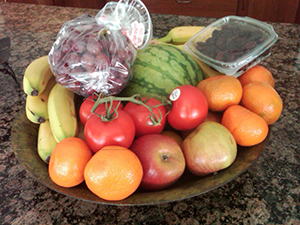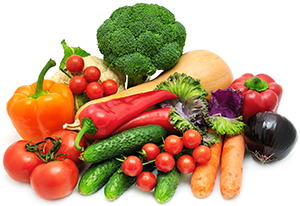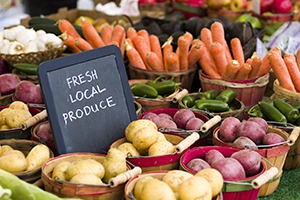One of the primary scenarios many preppers prepare for is the loss of the electrical grid. Without electricity life as we know it is not possible and one of the appliances we rely on heavily to keep our food good would simply not work anymore. I’m talking about the refrigerator, that appliance that keeps our food fresher longer so we can shop once a week and happily eat the food we have, knowing we won’t die of some terrible foodborne illness.
So what would you do if you had no refrigerator? Could you survive? Of course, you could! Human beings lived for millennia without refrigeration. The difference between them and us is that they knew how to:
- Store food they weren’t eating
- Not cook more than they needed at any given meal
- Preserve food so it keeps for the long-term (which is required in regions where winter visits once a year)
Many people are even choosing to live without refrigeration now, prior to any collapse of the grid or society, simply because they want to cut their dependence on the grid and/or lower their energy costs. However, if you are going to live without the use of a fridge, then you need to know what you are doing. Different foods have different storage requirements and you will need to change the way you shop and the way you prepare meals if you are living without a fridge. First, let’s take a look at different foods and how to store them without refrigeration. Then we will cover some other basic tips.
Foods and How to Store Them
There are certain foods that need refrigeration and there are foods that we think need refrigeration. In fact, you might be surprised at what foods will keep well out of the fridge, and no, I’m not talking about that cold soda or beer. Here are some food-storage rules you need to know.
Fruit
 Most fruit can store just fine on the counter. However, the shelf-life of fruit without refrigeration varies, depending on the type of fruit. Fruit with thicker skins, such as oranges and apples, are generally good for around a month. Pears will last up to 2 weeks. Bananas don’t last as long. Just a couple days to ripen and then you need to eat them up before they get too ripe.
Most fruit can store just fine on the counter. However, the shelf-life of fruit without refrigeration varies, depending on the type of fruit. Fruit with thicker skins, such as oranges and apples, are generally good for around a month. Pears will last up to 2 weeks. Bananas don’t last as long. Just a couple days to ripen and then you need to eat them up before they get too ripe.
Pineapples and mangoes should be eaten within 24 hours of ripening, which usually takes 3-4 days. The one type of fruit that definitely does not last long without refrigeration is berries, which should be consumed within 24 hours of purchase or harvest.
Related: How to Grow Fruit All Year Round
Vegetables
 Vegetables are easier than fruit to store without refrigeration. There are quite a few vegetables that can be stored for up to a week on the counter if placed standing with the cut end in water, including:
Vegetables are easier than fruit to store without refrigeration. There are quite a few vegetables that can be stored for up to a week on the counter if placed standing with the cut end in water, including:
- Lettuce
- Celery
- Broccoli
- Kale, cauliflower, cabbage, or any of the brassica family
- Herbs
Here is a list of other vegetables and how long they will last without refrigeration:
- Potatoes (1-2 months)
- Onion (1-2 months)
- Sweet potatoes (1-2 months)
- Garlic (1 month)
- Tomatoes (up to 1 week if ripe, up to 2 weeks if green)
- Summer squash, such as zucchini (2 weeks)
- Winter squash, such as butternut and acorn (1 month)
- Peppers (1-2 weeks)
- Eggplant (1 week)
- Turnips and beets (3-4 weeks)
- Carrots (2 weeks)
Related: Top 10 Foods to Grow for Survival
The most important thing to remember is that all produce, including fruit and vegetables, should remain unwashed and must never have been refrigerated. Washing can cause produce to spoil more quickly because it makes it easier for bacteria to get to it. Previous refrigeration can cause condensation to form on the food, attracting mold and bacteria.
Eggs
Eggs are something that we tend to put in the fridge, but they don’t actually need refrigeration. Eggs can sit on the counter for a week and be just fine, provided they haven’t been previously refrigerated (for the same reason as produce) or washed. If you wash the eggs, you will remove the natural antibacterial coating on the eggs, which is called bloom. If there is a lot of dirt, then use a cleaning pad to cleanse the shell. If water is required, then use cool water and no soap.
There are also a number of preservation methods that you can use that will allow eggs to keep longer than a week. If you have a root cellar or basement, that is a good start. You can also coat the eggs in something non-toxic that will seal the pores and keep oxygen out. Traditionally, people have submersed them in a solution of liquid sodium silicate or have coated them in lard or shortening.
Related: How to Make Powdered Eggs
Dairy
This is where having no refrigeration starts to become challenging. Let’s begin with butter and cheese. Salted butter can actually keep unrefrigerated for up to 2 weeks, although if you have a cooler place, such as a cool basement or cellar, that would help extend the shelf-life. The same can be said for a number of different cheeses, particularly hard cheeses.
When it comes to milk, it just has to be refrigerated. If you can do without milk, that’s great. If you use it in small quantities for cooking, then buy it and use it the same day. If you need more milk, then the best thing is to use powdered milk or canned or other milk that is packaged for shelf-storage.
Meat
Meat is the other difficulty when it comes to no refrigeration. Fresh meat will not keep without it. Period. If you eat meat, then you must cook it the same day you buy it. For short periods of time (within 24 hours) you can keep it in a cooler. You can also purchase canned meat or dried meat, which will store for long periods of time.
Related:How the Early Pioneers Preserved Food and What They Ate
Condiments
The final thing we usually keep in the fridge is condiments, but we actually don’t need to. Condiments can keep just fine if stored without refrigeration. Jams, jellies, and maple syrup will keep between 2-4 weeks. Peanut butter does much better, with a shelf-life of months. When it comes to honey, it has an indefinite shelf-life, although it might crystalize.

Ketchup, relish, mustard, and anything pickled will last for a number of months without refrigeration. Surprisingly, even mayonnaise will last indefinitely, but only if no bacteria gets into the container. As long as you take care to use a clean spoon each time you use the mayonnaise or buy it in a squeeze bottle, you will be fine.
Other Tips
Now that you have a good idea of what foods you can store without refrigeration and for how long, there are a few other things you should know about living without a fridge. Here are some final tips to take away with you.
Leftovers
This might be the most difficult to deal with – no leftovers! Without a fridge, you won’t be storing leftovers for a few days so you can eat them later in the week. You won’t be making that mammoth batch of soup to eat for lunch all week. When living without refrigeration, you will need to cook smaller meals that will be eaten then and there. If you happen to have anything left over, you need to it within 24 hours.
Related: 10 Foods Not to Store
Find Other Storage Methods
You aren’t limited just to counter storage if you don’t have refrigeration. There are a number of ways you can store food to help it keep cool without using a fridge. Here are some suggestions:
- Root cellar/basement: This was mentioned above and it provides a great place to store produce and preserves when you have no fridge.
- Evaporating cooler: Use a cistern or screened enclosure in which to store your food and then cover with damp cloths. The evaporation from the cloths will help keep it cool inside, but you can only do this if you live somewhere that does not experience high humidity.
- A Zeer pot: A Zeer pot is simply another form of evaporative cooling. Two terracotta pots, one smaller than the other, are used. Put the smaller pot inside the lager pot and fill the space between them with wet sand. Cover it with a damp cloth and re-dampen the cloth and the sand when required.
- Don’t harvest: If you grow your own food and it will keep just fine in the ground or on the plant, then leave it there until you are going to use it.
Shop Daily
Do what the Europeans do and shop for your meat and produce daily. This way, you will use what you buy in the same day and you won’t have much to store. It certainly keeps things simple.
Buy from the Farmer
 Purchase your produce, eggs, and meat (when possible) directly from the farmer, either at the farm or a farmer’s market. That way you can ensure the food has been not been previously washed or refrigerated and you know how it was grown/raised. This gives you more control over the food you buy.
Purchase your produce, eggs, and meat (when possible) directly from the farmer, either at the farm or a farmer’s market. That way you can ensure the food has been not been previously washed or refrigerated and you know how it was grown/raised. This gives you more control over the food you buy.
At the end of the day, a refrigerator is a convenience, one that we have come to depend on so deeply that it feels like a need. However, a fridge is an energy guzzler that we can live without, if we are willing to change our shopping and eating habits and make some adjustments. Give it a try and you might find you like it.
You may also like:
33 Essential Foods to Stock Pile
Simple Trick To Make Any DIY Project (Video)
How To Preserve Beef in Glass Jars
The Battery That Can Power Your Home Completely Off The Grid
How to Keep Grains Edible and Fresh for Over 40 Years With Nitrogen






















Hey guys: The foregoing information is really great and everyone that wants to survive should be making copies of this information that has been written up by someone that cares. You just might need this information very, very, soon. Thanks and keep up the great work, really appreciate it
Wow…GREAT info, and several surprises (lettuce in water, and mayo out of the fridge). The links within the article are also very informative!
Is the table of condiments giving times for refrigerated foods or refrigerated ones?
Vinegar, honey, salt, sugar have an Indefinite shelf life.
Vinegar and honey should be properly stored.
Vinegar cool, dark.
Honey can harden over time and just needs to be warmed to re-liquefy… do not microwave honey as that destroy’s honey’s beneficial enzymes.
Good info on the Periodic Table, but it isn’t 100% accurate. User needs to do their own homework.
I started life during the depression without refrigeration
“Shut the (meat” safe door after you was said frequently to us a kids
Fresh killed mutton was hung hogh up onthe sycamore tree above the “fly” level for some days
Cooking on wood stove
Treats came vis the garden and wasting tank water meant really necessary washing use only
A good catch of netted fish resulted in generoud instant sharing with neighbours
It was a good way to grow up
wow I must be doing something right…
my garlic lasts from harvest to the next harvest and my eggs sit om the counter for a month or 2 just fine., so long as the house is below 80`F
My garlic also always lasts over a year, Mo! I keep mine in an unheated garage. Where do you keep yours?
Great ideas
Back when I had a garden, I routinely stored winter squash most of the winter. The trick is not to keep it too cool, squash will rot if too cold. I kept mine in a room that stayed in the 60’s, one of my friends keeps hers in her living room. They store just fine for several months.
A few years ago 5 zucchini got away undetected. They were 24″ to 30″ long, and about 7″ in diameter. Monsters. Their skin was still easily pierced with a fingernail, and the seeds, although large, were tender. I cut one up and we ate it for several meals. I asked a neighbor kid to haul them downstairs to the root cellar while I pondered what to do with them. Then I forgot all about them for 4 months. I groaned when I finally remembered them, and was afraid to open the cellar door. But — their skins had started to turn yellow in spots, the way squash do when a large leaf is lying on them, but, to our amazement, they were still tasty, juicy, and quite edible! The seeds had started to get tough, but were so big, it was easy to cut them out before cooking. I cooked two of them, but gave up and composted the other two. I don’t know why they lasted so long. Organically grown? A very nice growing season, not too much water, not too little? Sometimes lucky accidents happen, too!
I disagree with most of what I red. I stopped after potatoes and winter squash. We kept potatoes from fall to next spring, and winter squash even longer. If the rest of the article was as incorrect as these I am glad I did not read it. My garlic lasts from Sept. to gone in late spring or is replanted for another crop.
The Zeer pot won’t work well in humid climates. The evaporation it depends on is going to be best in a dry area. This isn’t to say it won’t work at all, but don’t expect any drastic cooling or food life lengthening with it.
I know a lady who got a really good deal on sweet potatoes, she keep them in her unheated upstairs, all winter and in the spring they were still good,but she was just tired of eating them,so she finally fed them to her chickens.
Does anyone have any ideas on how to keep medicine (like insulin) at a temp between 30 – 40 degrees when we won’t have refrigerator’s anymore?
For about $600 you can get a solar powered generator complete with solar panels. That easily runs a small refrig. Also, you can dig a hole in the ground and bury and bury a metal garbage can with lid. Put holes in bottom for drainage. Bury and cover with hay or straw. Inconvenient but the earth is 55 degrees. If block ice is available, wrap in garbage bag and add to garbage can for lower temp.
Dakota: Depending on where you live dictates the depth of the can, but deeper is better. Cut a thin piece of plywood the size of the bottom of the can, attach 3 or 4 thin ropes to the board to raise it out of the can compensating for the depth. Also a thick slab of Styrofoam works well for a lid
What kind of salt should be used to preserve meat?
For protein consider dry salamis and hams. These cured meats are meant to go the distance. Heavily salted hams are meant to be hung in a cool place with slices taken as needed.
Also my farm raise mom, during wwII no fridge at all. Fresh meat was a rarity.
Unless you want to get botulism, I’d ignore the mayonnaise advice! Most mayonnaise contains eggs. Unopened, it will be ok, but once it is opened, you MUST refrigerate it. Ever hear advice about picnics and leaving potato salad out and people getitng sick, maybe dying of botulism? That’s because most potato salad has mayonnaise in it, and if not refrigerated will spoil and you WILL get sick.
Mayo MUST be refrigerated once open. Any food or condiment with mayo has to be refrigerated.
STORE bought eggs MUST be refrigerated. those purchased from a farm , IF they have NOT been refrigerated or put in the cold, will be ok on the counter. Washing them will then require them to be refrigerated.
I keep butter (usually unsalted) frozen until I need it, then put it in a glass storage container with a lid (to keep my cat and dust out) on the counter. This is done summer and winter, with no problems. The ONLY time I had an issue with butter was when I bought one of those upside down crocks you put water in, and it molded. Threw the butter crock out.
I have problems with some of this article.